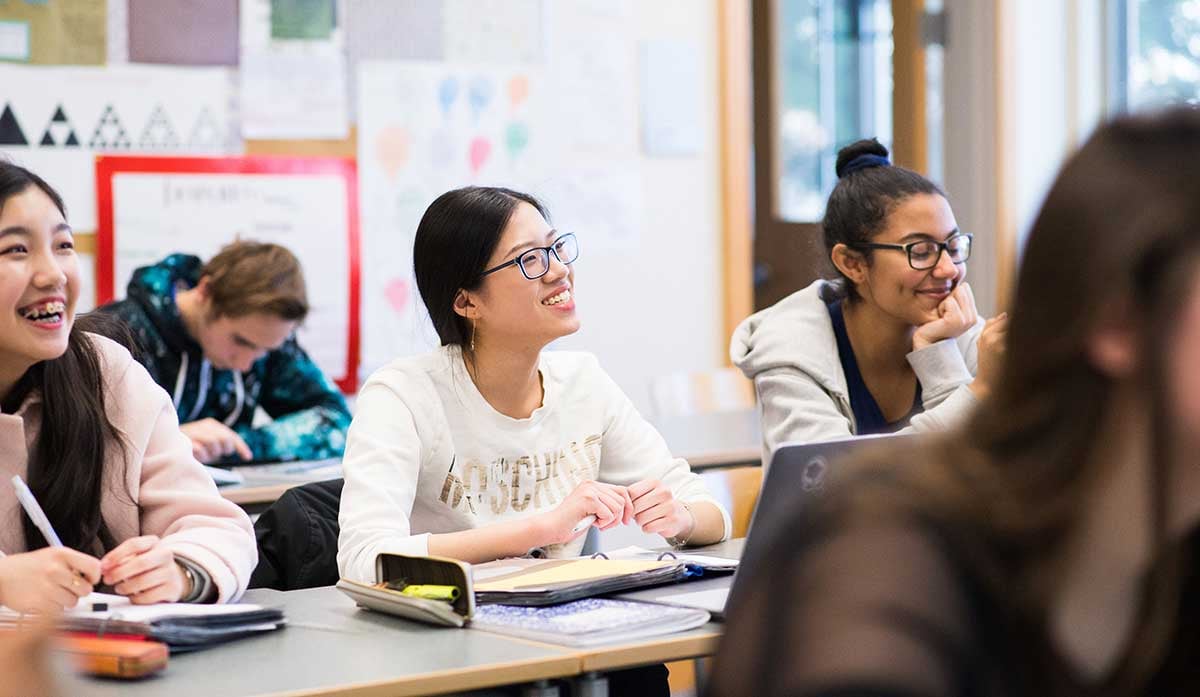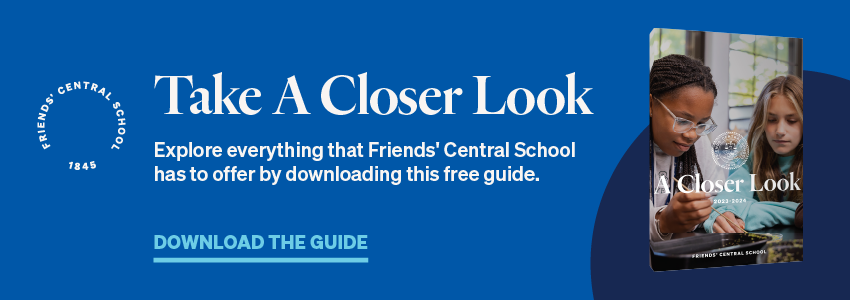
For many parents, preparing children to succeed in the classroom—particularly beyond elementary school—can be a challenge. Parents are continually asking themselves questions like: “Should my Middle Schooler be taking higher level classes?” “Should my junior take the SAT or ACT?” “What can I do to prepare my senior for life beyond high school?”
The truth is, for most of the specific questions that parents have, there isn't a right or wrong answer. Educational pathways are going to be different from child to child, and that's okay! Instead of trying to figure our whether or not AP classes are as important as they sound, or whether it's really that important to begin laying the groundwork of STEM in kindergarten, parents would be much better served by thinking about whether or not their children are developing the qualities and life skills that will help them be successful throughout their academic careers and broader life.
Free Downloadable Guide: Take a Closer Look at Friends' Central School
To help you frame your thinking around your child's education, we've pulled together a list of the 10 most important life skills and qualities that any curriculum should be developing in your child, which will help them be successful from elementary school to college—and beyond!
10 Life Skills Every Child Should Learn
1. High-level thinking
Successful students are independent, critical thinkers who know how to gather and synthesize information from a variety of sources. While this has always been important, it has become more and more important in recent years as new sources of information—like the internet and social media—continue to develop and evolve.
2. Creativity and curiosity
Creative thinking and a sense of curiosity can help students think outside the box and form deep, meaningful connections to their learning. It encourages students to look at, explore, and reflect upon the world around them and within themselves, stimulating their mind and allowing them to be better students and learners, capable of recognizing patterns and seeing connections that’ll help them solve complex problems.
3. Empathy and compassion
Children learn compassion early on through everyday interactions with the people around them. But if they continue to hone that skill into their teenage years, that can be the mark of a true leader and lifelong learner who can prioritize the greater good. Like any skill, empathy and compassion must be regularly practiced and challenged.
4. Leadership skills
When students step up and lead the way—whether by running for student council, organizing volunteer opportunities, or speaking out against an injustice—they take ownership of their learning and their lives and become advocates for change. Developing leadership skills allows students to be empowered and understand that they have agency over their lives and the lives of others.
5. Sense of agency and self-determination
When students understand themselves as learners, they are engaged in what and how they’re learning. This allows them to become strong self-advocates, acknowledging when they need support or when they need to be further challenged—an important skill for all of us to develop!
6. Confidence
Developing self-confidence enables students to speak up and share their perspective while understanding the need to hear and respect the thoughts of others. By presenting a child with a challenge and supporting them as they work to solve it on their own, a successful academic program will naturally help children become self-confident, capable citizens.
7. Communication skills
A good communicator articulates a point of view effectively in order to participate fully in their classes, their careers, and their overall life. A quality education will help a child to develop the gamut of their communication skills, from reading and writing, to having a conversation and debating, to engaging in visual, musical, or dramatic arts—and everything in between.
8. Collaboration
When students understand the importance of listening to and working with others, they are better problem solvers and team players. This allows them to earn the respect of their peers, helping them to succeed both in the classroom and the workplace.
9. Resilience and flexibility
Resiliency and flexibility are incredibly important qualities for all students to develop, as they'll be leveraged throughout a child's life. These qualities allow students to see challenges as opportunities, and grow from their mistakes with humility.
10. Open-mindedness and respectfulness
By listening deeply and taking a genuine interest in the experiences of others, students are able to engage in community authentically and are willing to grow through understanding others.
Encouraging the Qualities that Matter Most
The best way for parents to cultivate these qualities in their children is to act as an example by modeling them in everyday life. But modeling positive behavior at home can only go so far: It's also important that these positive qualities are reinforced in your child's school, social circle, and broader community.
These 10 essential qualities are hallmarks of a Friends’ Central graduate. Graduates of Friends’ Central School are known for their high-level thinking, their ethical grounding, their work ethic, and a sense of agency that allows for entrepreneurial and effective leadership in their quest for personal success and community engagement.
Critical, independent thinkers who are unafraid to keep learning, Friends’ Central graduates have a breadth of knowledge across disciplines. They have faith in their own ideas, have had numerous leadership opportunities to build upon, and are willing to accept responsibility. Confident in themselves and their ideas, graduates of Friends’ Central have a strong work ethic and good work habits. They are self-advocates who aren’t afraid to ask for help, and have a sense of self strong enough to hear and respect other people’s truth. They have conviction and a spiritual foundation that enables them to want to take action while being reflective and empathetic. They articulate a point of view clearly, listen deeply, participate fully in class and meetings, and have experience collaborating with people different from themselves, benefiting from others’ wisdom.



